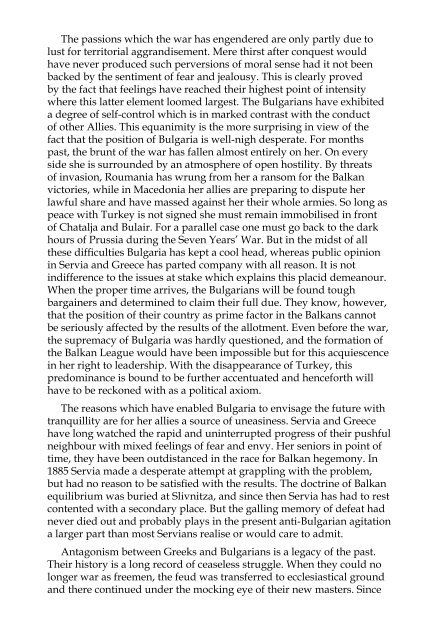Bulgaria e-book - iMedia
Bulgaria e-book - iMedia
Bulgaria e-book - iMedia
You also want an ePaper? Increase the reach of your titles
YUMPU automatically turns print PDFs into web optimized ePapers that Google loves.
The passions which the war has engendered are only partly due to<br />
lust for territorial aggrandisement. Mere thirst after conquest would<br />
have never produced such perversions of moral sense had it not been<br />
backed by the sentiment of fear and jealousy. This is clearly proved<br />
by the fact that feelings have reached their highest point of intensity<br />
where this latter element loomed largest. The <strong>Bulgaria</strong>ns have exhibited<br />
a degree of self-control which is in marked contrast with the conduct<br />
of other Allies. This equanimity is the more surprising in view of the<br />
fact that the position of <strong>Bulgaria</strong> is well-nigh desperate. For months<br />
past, the brunt of the war has fallen almost entirely on her. On every<br />
side she is surrounded by an atmosphere of open hostility. By threats<br />
of invasion, Roumania has wrung from her a ransom for the Balkan<br />
victories, while in Macedonia her allies are preparing to dispute her<br />
lawful share and have massed against her their whole armies. So long as<br />
peace with Turkey is not signed she must remain immobilised in front<br />
of Chatalja and Bulair. For a parallel case one must go back to the dark<br />
hours of Prussia during the Seven Years’ War. But in the midst of all<br />
these difficulties <strong>Bulgaria</strong> has kept a cool head, whereas public opinion<br />
in Servia and Greece has parted company with all reason. It is not<br />
indifference to the issues at stake which explains this placid demeanour.<br />
When the proper time arrives, the <strong>Bulgaria</strong>ns will be found tough<br />
bargainers and determined to claim their full due. They know, however,<br />
that the position of their country as prime factor in the Balkans cannot<br />
be seriously affected by the results of the allotment. Even before the war,<br />
the supremacy of <strong>Bulgaria</strong> was hardly questioned, and the formation of<br />
the Balkan League would have been impossible but for this acquiescence<br />
in her right to leadership. With the disappearance of Turkey, this<br />
predominance is bound to be further accentuated and henceforth will<br />
have to be reckoned with as a political axiom.<br />
The reasons which have enabled <strong>Bulgaria</strong> to envisage the future with<br />
tranquillity are for her allies a source of uneasiness. Servia and Greece<br />
have long watched the rapid and uninterrupted progress of their pushful<br />
neighbour with mixed feelings of fear and envy. Her seniors in point of<br />
time, they have been outdistanced in the race for Balkan hegemony. In<br />
1885 Servia made a desperate attempt at grappling with the problem,<br />
but had no reason to be satisfied with the results. The doctrine of Balkan<br />
equilibrium was buried at Slivnitza, and since then Servia has had to rest<br />
contented with a secondary place. But the galling memory of defeat had<br />
never died out and probably plays in the present anti-<strong>Bulgaria</strong>n agitation<br />
a larger part than most Servians realise or would care to admit.<br />
Antagonism between Greeks and <strong>Bulgaria</strong>ns is a legacy of the past.<br />
Their history is a long record of ceaseless struggle. When they could no<br />
longer war as freemen, the feud was transferred to ecclesiastical ground<br />
and there continued under the mocking eye of their new masters. Since<br />
their restoration to independent life, they have not been able to revert<br />
to the old tradition owing to Turkey’s presence as buffer state. This<br />
involuntary truce, however, has not turned hatred into love. They are<br />
once more to have a common frontier and will thus be brought in direct<br />
contact.<br />
... The war has widened the gulf between these races by adding to<br />
the old stock of animosities a fresh supply of military jealousies. It has<br />
let loose over the entire Peninsula a flood of vanity which has upset the<br />
balance of a good many heads. A year ago, no sane Servian would have<br />
dreamed of pitting his country against <strong>Bulgaria</strong>, and this recognition of<br />
inferiority stood for peace. Now, every Servian officer is convinced that<br />
the result of such a trial of forces would be favourable to Servia, just as<br />
he is persuaded that the issues of the war with Turkey have been decided<br />
mainly by Servian valour....<br />
If this is the way in which Servians are wearing their laurels, it can<br />
be imagined what the effect of recent events has been on impressionable<br />
Greece. To the trepidation with which the war was entered has<br />
succeeded the feeling of boundless self-reliance. All sense of reality<br />
and proportion has been banished, and there is no exploit which seems<br />
beyond the reach of Greek effort.<br />
The outbreak of a fresh Balkan war would, in the present<br />
circumstances, prove little short of a world-wide calamity. Should,<br />
however, Europe succeed in localising such a conflict, its miseries will,<br />
to a certain extent, be compensated by one very important advantage.<br />
A trial of forces between the various Balkan competitors will clear the<br />
atmosphere and settle in the only efficacious way the sore problem of<br />
Balkan hegemony, which is at the bottom of Balkan unrest. It will fix<br />
for a long term of years the respective positions of the parties. Just as<br />
the Servo-<strong>Bulgaria</strong>n War in 1885 proved a blessing in disguise, so this<br />
time also the arbitrament of the sword might create conditions more<br />
favourable to the political stability of the Peninsula. And this will be a<br />
gain not only to the Balkan nations, but to the whole of Europe.<br />
The last thing of which that <strong>Bulgaria</strong>n writer dreamt was the<br />
actual result of the fresh Balkan war, which did break out and which<br />
ended in the humiliation of <strong>Bulgaria</strong>. He contemplated the necessity<br />
of palliating to European minds the enormity of a fratricidal war<br />
between allies who had sanctioned their war against Turkey as a<br />
struggle of the Cross against the Crescent; but he had no idea that<br />
there was the barest possibility that <strong>Bulgaria</strong> would have to suffer<br />
complete defeat instead of explaining victory.<br />
The Conference of London which endeavoured to arrange a<br />
peace after the first phase of the Balkan war met first in December





